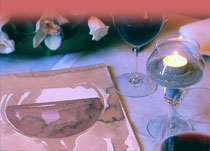Richard Burton and Jean Salvadore
Photo By Courtesy Photo

Joseph Heller and Jean Salvadore
Photo By: Courtesy Photo
Jean Salvadore hasn’t only observed the good life, she has lived it.
That said, the title of her autobiography, “My Dolce Vita,” is most fitting. Aside from being the grand dame of Villa d’Este, Lake Como’s majestic five-star retreat, for the past 43 years, Salvadore spent the first 20 years of her career looking after a battery of celebrities while handling TWA’s Italian press. The well-dressed fiery redhead was ready and waiting on the tarmac whenever Montgomery Clift, Gregory Peck, Humphrey Bogart, Lauren Bacall, Audrey Hepburn, Ingrid Bergman, Frank Sinatra, Ava Gardner, Elizabeth Taylor or any other bold-faced name touched down in Rome.
The Paris-born Salvadore has culled all sorts of colorful stories from her decades of keeping diaries, a practice she first picked up as a schoolgirl in England, for her book, which is published by Glitterati. Like any good hostess or friend, she couldn’t help but turn a morning interview into a conversation with labyrinths of side stories about Bette Davis, Slim Aarons, Douglas Fairbanks Jr. and other travelers she befriended. “I always like to say what Mae West said: ‘Keep a diary, hon, because one day it will keep you.’”
Cinematic as Salvadore’s life has been, her most indelible memory is far from anything Fellini-esque. Seeing the Allies march into Rome and put an end to the German Occupation in 1944 was by far the happiest day of her life. “You would think it would be the day my son was born or the day I got married, but it was the day the Allies arrived. It was the most thrilling thing I have ever seen — better than any movie. We all went crazy. We were famished and thirsty because there was little water, because our darling Americans had bombardiered the aqueduct,” she said.
The day after the liberation of Rome, an American overheard Salvadore and her mother, Isaly Govoni, speaking English on the street. “This guy had a band around his arm that read ‘Stan the Donut Man,’ and he asked my mother if I could help hand out coffee and donuts to the Allies for the Red Cross. My mother said, ‘Of course — we owe this to you.’” Salvadore recalled. “I mean, they saved our lives. The atrocious things I saw that happened before…”
Perhaps that is why the octogenarian feels a kinship with the U.S. After her husband Luca died, she bought a Murray Hill apartment — “It had always been a dream of mine” — for extended off-season stays and to catch up with American friends. “People always say, ‘Have you been to Japan or wherever,’ and I tell them no, I don’t know anybody there. I only go where I have friends. That’s what I adore about Americans — you can become friends in very little time.”
It is easy to see how Salvadore — loyal, gracious and refreshingly frank — has endeared herself to the well-known and lesser knowns, giving them reason to return to Lake Como year after year. Anthony Hopkins and his family had been unwinding there shortly before she jetted off to Manhattan for a book signing and an intimate dinner with friends at Plaza Athénée. “They enjoyed it because nobody bothered them,” Salvadore said of the Hopkinses.
Her run at TWA during the Howard Hughes days no doubt provided a crash course in discretion. “He would be so grateful if his name was never in the papers. Of course, it’s not like that today. They would kill to be photographed,” Salvadore said.
Giving guests their privacy is a calling card she shares with Villa d’Este’s top brass, Jean-Marc Droulers. But even Salvadore can be put to the test from time to time. When guests pestered Robert De Niro for autographs during one of his stays, he threatened to leave if the hotel staff did not put an end to it. They obliged by putting up a makeshift tent, but Salvadore wondered, “He’s a great actor. How did he become famous? Because of his public.”
Bette Davis, who visited Villa d’Este in 1988 for a celebration of the 60th anniversary of the Academy Awards, put her through the paces too. “What an honor it was to sit and chat with her. As a person, she was impossible, but I was fascinated by her and we became quite friendly,” Salvadore said. “She once said about marriage, though she never put it into practice, ‘The only way to keep a marriage going is to have one big bed and two bathrooms.’”
While heading up TWA’s public relations, she wrote a column for Amica and often used her flight privileges to travel for the magazine. For an assignment about the 1962 Academy Awards, she planned to travel with Sophia Loren, a best actress nominee for “Two Women.” But the screen siren balked when Salvadore rang her up to offer to accompany her. “She said, ‘I will only go if I am assured I’ll win.’ I said, ‘You’re not being a good sport. That is no way to behave. Who do you think you are?’” Salvadore said.
As luck would have it, she found good company in Paul Newman, who happened to be in the first-class cabin with his wife, Joanne Woodward, on the flight from Rome. The actor was more than happy to chat once his wife, a jittery flier, dozed off. Salvadore said, “First we have to get Joanne to sleep. I don’t know what he gave her, but he knocked her out with something.”
Salvadore’s recollections are peppered with these and other insiderish asides, such as how Robert Mitchum “could tuck away quite a few drinks,” and how Davis (“Miss D” to friends) nearly cried before leaving Villa d’Este. A few years back, Salvadore struck up a conversation with a newcomer to Lake Como, who, unbeknownst to her, was George Clooney.
She was less welcoming years ago when Gianni Versace kept her and photographer Slim Aarons waiting for hours for a portrait. Aarons, whom Salvadore had not seen since they had first met, on the day after Rome’s liberation, when he was a war correspondent, was on assignment and staying at Villa d’Este. “Villa Fontanelle [the late Versace’s home at the time] is just around the bend from Villa d’Este. His majordomo showed us in, and we sat and we sat and we sat. I thought, What has happened to this guy? Finally he showed up,” she said, extending her arms theatrically, like an actor taking a bow. “I was so furious that I walked out. I told him, ‘This is a great American photographer you have kept waiting. No excuses,’” she said. “Slim was a perfect gentleman, and he told me he would stay. It wasn’t for me that I was so angry. All my life I have had to stand in lines for things. It was for Slim.”
Such dustups were few and far between. Having had a marriage of 40-plus years, two “wonderful” children, globe-trotting, an apartment in Rome, a villa in Fregene and now a permanent address that overlooks a lake that many remember fondly years after they have visited, Salvadore has good fortune that many can’t be faulted for envying. “People always say, ‘You’re so lucky.’ Yes, I was lucky, but I worked hard at it,” she said. “That’s not nice to say. But if I love a person, I go all out for them.”



 100 Best Gluten-Free Recipes by Carol Fenster
100 Best Gluten-Free Recipes by Carol Fenster

.bmp)

